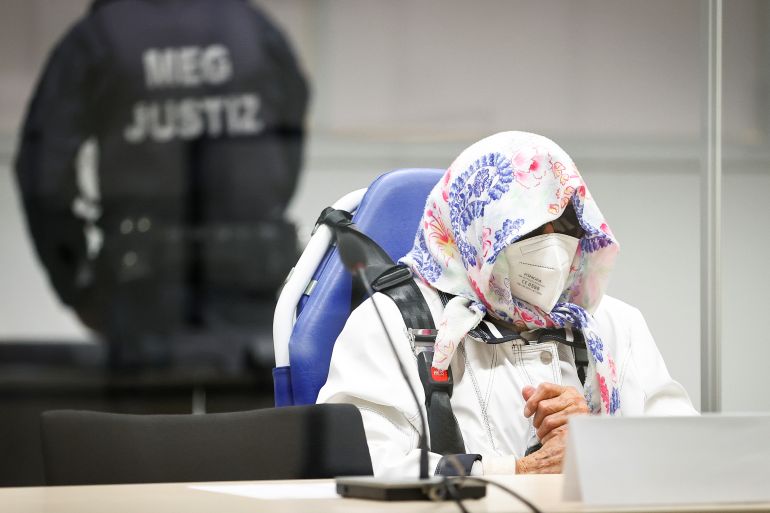German court convicts 97-year-old ex-Nazi camp typist
Irmgard Furchner has been found guilty of complicity in mass killings at WWII concentration camp.

A German court has convicted a 97-year-old woman of complicity in the murder of more than 10,500 people during her time working as a typist at a Nazi concentration camp in World War II.
The state court in the town of Itzehoe, in northern Germany, handed Irmgard Furchner a two-year suspended sentence in line with prosecutors’ demands.
Keep reading
list of 4 itemsGermany sentences 101-year-old Nazi camp guard to 5 years in jail
Germany finds hundreds of Nazi-linked staff in security agencies
German Nazi war crimes suspect, 96, faces court
She was sentenced under juvenile law, owing to the fact she was only 18 years old at the time of the crimes.
Public prosecutor Maxi Wantzen said the trial was of “outstanding historical importance”.
She added that it was “potentially, due to the passage of time, the last of its kind”.
Systematic killing
Furchner worked at the Stutthof concentration camp between 1943 and 1945 and was accused of being part of the apparatus that helped it function.
She was alleged to have “aided and abetted those in charge of the camp in the systematic killing of those imprisoned there between June 1943 and April 1945 in her function as a stenographer and typist in the camp commandant’s office.”
More than 60,000 people were killed at the camp by being shot, starved or given lethal injections of gasoline or phenol directly into the heart. Others were forced outside in winter without clothing until they died of exposure or were put to death in a gas chamber.
Initially, a collection point for Jews and non-Jewish Poles removed from Danzig, now the Polish city of Gdansk, Stutthof from about 1940 was used as a so-called “work education camp” where forced labourers, primarily Polish and Soviet citizens, were sent to serve sentences and often died.
From mid-1944, tens of thousands of Jews from ghettos in the Baltics and from the Auschwitz network of concentration camps, filled Stutthof, along with thousands of Polish civilians swept up in the brutal Nazi suppression of the Warsaw uprising.
Others jailed there included political prisoners, accused criminals, people suspected of homosexuality and Jehovah’s Witnesses.
‘Absolute hell’
Furchner’s defence lawyers had asked for her to be acquitted, arguing the evidence had not shown beyond doubt that she knew about the systematic killings at the camp, meaning there was no proof of intent as required for criminal liability.
Al Jazeera’s Dominic Kane, reporting from Berlin, said Furchner had been sentenced on the “basis of the orders that she typed out” for the commander of the Stutthof camp.
“She was saying in court that she had typed out these orders, not followed them, which was what concentration camp guards have previously said in court,” Kane said.
“The other interesting element specifically about this woman and this particular case is that she testified against the commandant in a west German court in the 1950s and he was given a nine-year-sentence which he served and then went on to live out the rest of his life in freedom, despite having direct responsibility for tens of thousands of deaths,” he added.
“Now, justice has caught up with her, to the German sense that is, at least.”
In her closing statement, Furchner said she was sorry for what had happened and regretted that she had been at Stutthof at the time.
The start of her trial was delayed in September 2021 when she briefly went on the run. She was caught hours after failing to turn up to court.
Furchner sat impassively in a wheelchair throughout the eventual court proceedings in which several Stutthof camp survivors offered wrenching accounts of their suffering.
Prosecutor Wantzen thanked the witnesses, many of whom also served as co-plaintiffs, saying they had told of the “absolute hell” of the camp.
“They feel it is their duty, even though they had to summon the pain again and again to fulfil it,” she said.